By Andrew Cohen
Every year, the American Society of International Law receives submissions for its annual research conference. Predictably, those selected are almost always faculty scholars.
But at the recent event in Miami, Berkeley Law flipped the script with five current or recent students chosen to discuss their work: Anthony Ghaly ’23, Helena von Nagy ’22, Simone Lieban Levine ’21, and Ph.D. students Haley Anderson and Daimeon Shanks from the school’s Jurisprudence and Social Policy (JSP) Program.
“It was so impressive to have so many of our students present,” says Professor and international law expert Katerina Linos. “It represents the cumulative efforts of a lot of Berkeley Law faculty over the years. Getting students to prepare research good enough to be selected, through a blind competition at a conference like this where the vast majority of presenters are faculty, is a big deal.”
Classroom incubation
Ghaly and von Nagy developed their papers in Berkeley Law’s Human Rights and Social Justice Writing Workshop, taught by Eric Stover and Carolyn “Patty” Blum. Ghaly’s “From Guns to Scalpels: Reproductive Violence and the Gendered Future of Genocide” also grew from studying forced sterilizations in Peru as a student researcher at Berkeley Law’s Human Rights Center.
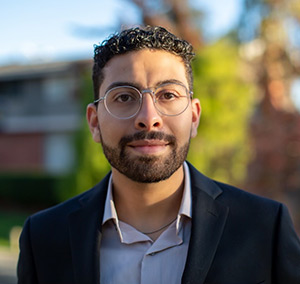
Under close supervision by Alexa Koenig, the center’s co-executive director, Ghaly shifted his paper’s focus to the use of forced sterilization against the Uyghurs in Xinjiang. Crediting Koenig, Stover, Blum, Professor Saira Mohamed, and his classmates for providing valuable feedback and support, he also relished the chance to reconnect with Levine and von Nagy.
“My initial research on Peru was actually in collaboration with Simone during my 1L year while we were still on Zoom,” Ghaly says. “We’ve stayed in touch since then and are even collaborating on some other pieces together. Simone graduated during the pandemic, so we didn’t actually get to meet in person until this conference.
“Helena and I have also known each other throughout law school, as we’ve occupied the same international law and human rights circles. Having the two of them there at the conference was really meaningful. It was comforting and encouraging to have such a supportive community with me.”
In 2019, von Nagy was studying in England when Shamima Begum — who left the U.K. four years earlier at age 15 to join ISIS in Syria — had her citizenship revoked while trying to return.
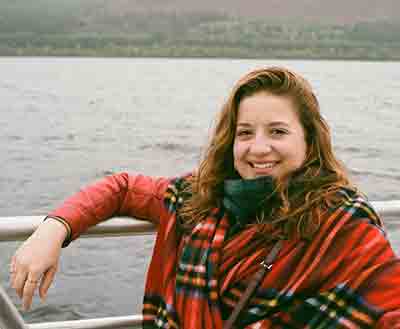
“My British classmates and I had many discussions about the decision to revoke her citizenship and I remember being incredibly baffled that citizenship removal was even an option,” von Nagy says. “When I came to law school, I learned more about the process of denaturalization for human rights offenders following Alien Tort Statute cases, and decided to turn back to Shamima’s story and write about the surge in denationalization in Northern Europe.”
That led to “Lay Bare Its Hidden Frame: The Deprivation of Foreign ISIS Fighters’ Citizenship in Denmark, the Netherlands, and the United Kingdom,” which took about a year to research and write. The seminar with Stover and Blum provided key structural guidance, and von Nagy also cites International Human Rights Law Clinic Co-Director Laurel E. Fletcher for instrumental input.
“It was so great to see so many familiar faces at the conference, and especially wonderful to see the students presenting such fabulous work along with the scholars,” von Nagy says. “It speaks very highly of Berkeley to have students conversing at the same level as well-established scholars in the field.”
Drawing historical connections
Levine didn’t start writing “Reparations for Involuntary Sterilization of Roma Women in Europe as a Framework for Latina Women in the United States” until after graduating. But she credits her Reproductive Rights and Justice class with Professor Khiara M. Bridges for learning about Madrigal v. Quilligan, a class action case in which 10 Latina women unsuccessfully sued a Los Angeles doctor — as well as other medical providers and government officials — who sterilized them without their informed consent.
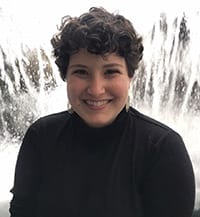
“With the recent reports of involuntary sterilization in ICE detention centers and the government’s insufficient response, I’ve been trying to figure out how best I can help survivors access justice while acknowledging my limitations,” says Levine, now clerking at the Vermont Supreme Court with the paper’s co-author, Rebecca Mitchell.
“I started learning more about widespread discrimination against the Roma people while I wrote a different paper during law school. As someone who is Jewish and whose grandmothers both survived the Holocaust, I grew up vaguely aware that Nazi Germany also targeted the Roma. But I was horrified to learn about the extent of the discrimination and how involuntary sterilization has been used as a eugenic weapon against the Roma. I was further horrified that it had taken me until I was in my mid-to-late 20s and midway through an advanced degree to learn any of this.”
Working at the intersection of reproductive justice and international human rights law, Levine compared the racist stereotypes around hyper-sexuality/hyper-fertility and the histories of involuntary sterilization for Roma and Latina women. From there, she wanted to write a “more practical than academic” article that could help advocates in the U.S. develop policy initiatives and litigation strategies based on the results of seeking accountability and reparations for involuntary sterilization of Roma women in Europe.
“Our large cohort at the forum and the way people interacted with me there indicated that Berkeley Law is a serious powerhouse in the international legal field and in churning out international legal scholars,” Levine says. “Being affiliated with Berkeley’s reputation, resources, and connections has proven to be the best investment I’ve ever made. This goes beyond rankings; it’s a testament to the immense effort that has been put into making Berkeley Law a respected hub for this work.”
Network dividends
Shanks’ interest in international criminal law led to a paper on the ideological functions of the emerging crime of ecocide, which he presented at a spring conference in The Netherlands and will be published next year in the Hague Yearbook of International Law. He received “valuable feedback” on a first iteration of his paper from Mohamed, who was a discussant for it in a JSP workshop series. This research project led to his invitation to the ASIL conference, where he presented a paper on the legal theory of international criminal law.
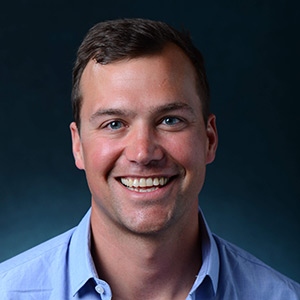
Anderson, who had worked with University of Hawaii Law Professor Randle DeFalco at JustSecurity.org before enrolling in the JSP Program, connected him with Shanks. Soon after, Shanks gave a guest lecture on ecocide in DeFalco’s International Criminal Law Class, and they stayed in touch.
DeFalco recently published the book Invisible Atrocities, and the Temple International and Comparative Law Journal offered to publish a symposium of reactions to it. He invited Anderson and Shanks to submit pieces, present during a roundtable at the conference, and participate in a workshop with other symposium authors.
“JSP is increasingly becoming an important site of international law scholarship for a variety of reasons, not least of which is a concentration of Ph.D. students in the current cohort that come from an international legal background and have incorporated that experience into our academic interests,” says Shanks, noting that he and Anderson previously worked at the United Nations’ International Law Commission. “Because there are more of us doing this work, the possibilities of our scholarship finding a wider audience will hopefully continue to grow.”
Anderson says the panel sought to shed light on atrocities that have been rendered invisible to the international community. Her written work for the book roundtable was titled, “Culpability in Atrocity and the Role of Complicit Viewer,” and her panel presentation was titled, “The Atrocity Aesthetic in the Xinjiang Uyghur Autonomous Region.”
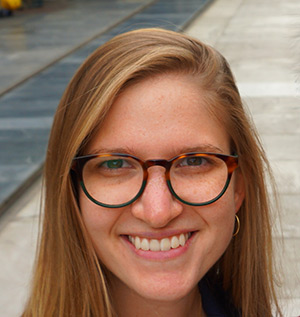
Long interested in mass atrocity cases, Anderson’s undergraduate honors thesis about Nazi Germany — and debates on whether Nazi “law” was law properly so called — fueled her path to law school. During that time, and working with Berkeley Law Professors David Singh Grewal and Kinch Hoekstra, she has studied the relationship between sovereignty and mass atrocity.
“While sovereignty ostensibly entails obligations of protection, it also frequently operates as a shield to prevent the investigation of state violence,” Anderson says. “DeFalco’s book provided a fantastic opportunity to consider what the category of atrocity that I often take for granted actually includes. I chose to focus particularly on the matter of complicity to press on the conceptual distinction between atrocity and other large-scale harm.”
Anderson notes that being invited with Shanks to participate in their conference events — where all other participants were law professors — demonstrates the strength of JSP specifically and Berkeley Law more generally in training future international law scholars.
“In another world, students like Daimeon and I who have different approaches might be in entirely different departments and never interact,” she says. “Being in JSP, however, has allowed us to connect through our shared interest in international law and learn from each others’ approaches, developing richer and more interesting work as a result.”